
The Joan Ganz Cooney Center Sandbox for Literacy Innovations aims to help developers incorporate evidence-based research and co-design methods with kids to create more effective literacy products. With generous support from the Walton Family Foundation, we are working with teams whose products are at an early stage in the development process to strengthen their literacy pedagogy and co-design more engaging and effective edtech with children. We collaborate with developers who are creating products that address literacy skills for a diverse population of learners across age ranges, from preschool to tweens and teens.
Participating companies work with Cooney Center experts over a six-month period to infuse early-stage products with research-based approaches to literacy development, co-design with children, and designing for the whole child. We will then continue to track the uptake of design choices and product performance in the classroom or at home.
Applications are now closed.

Partnership Criteria
The Sandbox for Literacy Innovations will be open to all entities who are:
- working on an interactive technology or media supporting English literacy development;
- for an audience of children or youth (ages 3-17) for use in either school or at home; and
- with a United States market focus.
Partners must be willing and able to commit to a six-month engagement including regular virtual meetings and in-person co-design sessions in New York City, and ongoing periodic reporting/engagement for two additional years.
Learn more about the Sandbox for Literacy Innovations:
Product Partners
Learn more about our current product partners here and read what they have had to say about the Sandbox for Literacy Innovations below:
Blog posts about the Sandbox for Literacy Innovations
- Building a Sandbox for Literacy Innovation
How can we rethink literacy learning for the digital age? The Cooney Center explores new ways to build a “sandbox” for literacy innovation—where educators, technologists, and researchers collaborate to empower young readers. - Sticky Notes, Clay, and Big Ideas: The Magic of Co-Designing Edtech with Kids
Young children are natural innovators, using simple materials like sticky notes and clay to explore big ideas. Co-design in which educators, families, and edtech developers collaborate to create learning tools that truly reflect how kids think and play. By embracing children’s creativity and problem-solving skills, we can build more effective and engaging educational experiences. - Experts Guide Innovations in Literacy Learning
In November 2024, the Cooney Center hosted a group of advisors to discuss key issues in the literacy crisis and the current landscape of edtech tools. Here are some of the expert-backed tips to help edtech creators build better literacy tools for kids that emerged from this meeeting. - The Cooney Center Sandbox: Embedding Literacy Expertise in Edtech Innovation
We’re excited to highlight a unique feature of the Sandbox for Literacy Innovations: a dedicated literacy consultancy embedded in edtech product development. Our own Diane Gifford and Angelica DaSilva bring deep expertise in literacy science and child development to help teams design stronger, research-informed tools for kids. This approach not only strengthens product quality,centering real literacy needs from the start.
Publication

From Big Ideas to Big Readers: Experts Guiding Innovations in Literacy Edtech
